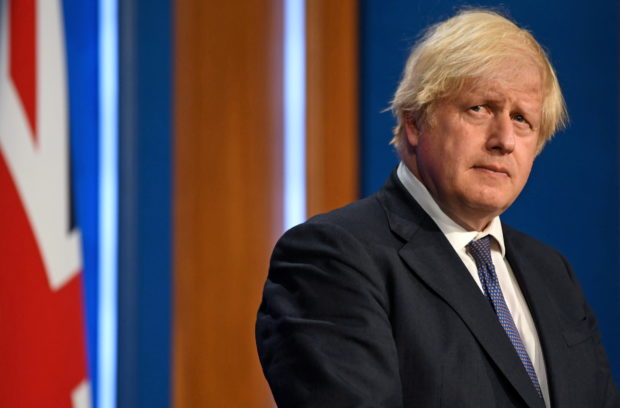UK PM Johnson exposed to COVID-19 but dodges full quarantine

Britain’s Prime Minister Boris Johnson gives an update on relaxing restrictions imposed on the country during the coronavirus disease (COVID-19) pandemic at a news conference inside the Downing Street Briefing Room in London, Britain July 12, 2021. REUTERS
LONDON — British Prime Minister Boris Johnson and his finance minister Rishi Sunak have been exposed to COVID-19 but will be exempt from some self-isolation rules and allowed to continue with essential work, drawing accusations of hypocrisy from opponents.
Johnson and Sunak were identified as contacts of someone with COVID-19, a day after health minister Sajid Javid said he had tested positive.
The virus has disrupted the heart of government at a time when its coronavirus response is under intense scrutiny: almost all remaining restrictions in England will be lifted on Monday despite a huge surge in infections as ministers put their faith in the advanced vaccine program.
As cases rise by more than 50,000 a day, hundreds of thousands of Britons are being asked to self isolate for 10 days, causing havoc for employers and parents, forcing train cancellations and causing some businesses to close their doors.
But, those isolation rules will not fully apply to Johnson and Sunak, who will instead be allowed to work from their offices and be subject to daily COVID-19 testing under a pilot scheme.
Article continues after this advertisement“They will be participating in the daily contact testing pilot to allow them to continue to work from Downing Street,” Johnson’s Downing Street office said on Sunday.
Article continues after this advertisement“They will be conducting only essential government business during this period.”
Johnson and Sunak will only have to self-isolate when not working.
Opposition politicians said it was hypocritical for Johnson and Sunak to be exempt from some of the rules.
“It looks like for a lot of us it is indeed one rule for them at the top and another for the rest of us,” Labour Party health spokesman Jonathan Ashworth told Sky News.
The government’s handling of the pandemic has been dogged with episodes that have damaged public trust – most recently when then-health minister Matt Hancock was pictured kissing an adviser, in breach of social distancing regulations. He later resigned.
Freedom day
Housing minister Robert Jenrick confirmed that the government would go ahead with its ‘freedom day’ plan on Monday, removing the requirement to wear face masks, lifting limits on social gatherings and allowing high-risk businesses to reopen.
Ministers argue that the vaccination program, under which 87.8% of the population has had one vaccine and 67.8% have been double vaccinated, has largely broken the link between cases and mortality.
“The last time we had cases at the level we do today, the number of people dying from the virus was 30 times the number it is today,” Jenrick told the BBC.
Nevertheless, the surge in cases is causing problems for employers, with more than half a million people told to self isolate via the government’s tracing app in the week to July 7.
In mid-August, Britain plans to change its rules on self isolation to exempt those who have been double vaccinated from the requirement to stay at home for 10 days.
The pilot scheme that Johnson and Sunak will join is currently running in 20 workplaces, including transport and immigration infrastructure, and eligibility is assessed on a case by case basis.
The study is designed to look at whether daily contact testing is an effective way of identifying new cases and whether it has any impact on transmission of the virus.
For more news about the novel coronavirus click here.
What you need to know about Coronavirus.
For more information on COVID-19, call the DOH Hotline: (02) 86517800 local 1149/1150.
The Inquirer Foundation supports our healthcare frontliners and is still accepting cash donations to be deposited at Banco de Oro (BDO) current account #007960018860 or donate through PayMaya using this link.